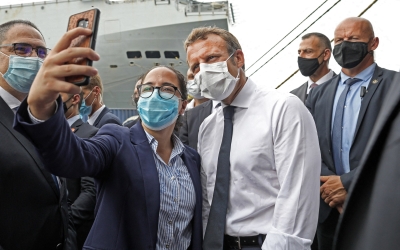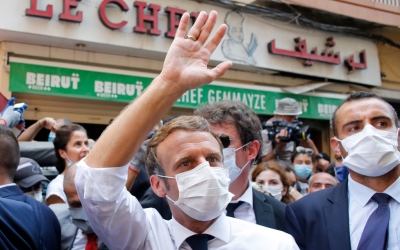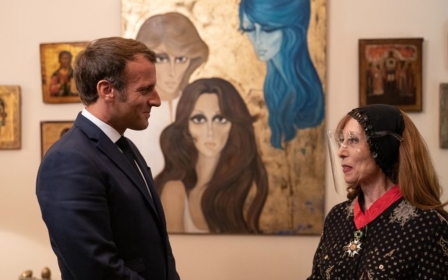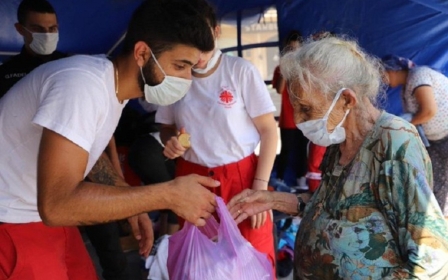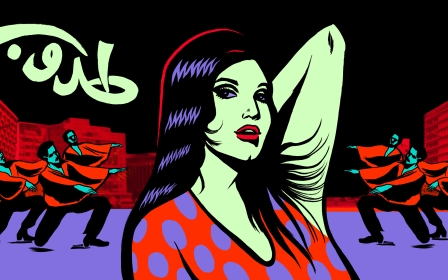Macron meets Lebanon's political elite as country marks centenary
French President Emmanuel Macron has warned Lebanese politicians that they risked sanctions if they failed to set the nation on a new course within three months, stepping up pressure for reforms in a country collapsing under the weight of an economic crisis.
Speaking to reporters in Beirut on Tuesday, Macron said that the coming six weeks were of “vital importance” for the future of Lebanon, reeling from last month's deadly port blast and rising sectarian tensions.
He also confirmed that he was ready to host an international conference in Paris in mid-October on how to help Lebanon.
“I am ready for us to organise, maybe around mid or late October, another international support conference with the United Nations,” he said after meeting UN representatives and local aid groups in Beirut.
The French leader was visiting Lebanon for the second time in less than a month to press his "risky" drive for political change in Lebanon, which was marking its centenary on 1 September.
His agenda for this trip includes a tour of the devastated Beirut port, a meeting with President Michel Aoun for a centenary reception and meetings with Lebanon's various factions.
"It's the last chance for this system," Macron told Politico in an interview while travelling to Beirut on Monday.
"It's a risky bet I'm making, I am aware of it … I am putting the only thing I have on the table: my political capital.”
Macron said he was seeking "credible commitments" and a "demanding follow-up mechanism" from Lebanon's leaders, including a legislative election in six to 12 months.
The French leader would return to Lebanon in December to "follow up" on progress made by Lebanese leaders towards enacting reform, AFP reported.
"I will personally commit myself to it," Macron said, vowing to block aid money donors had pledged to Lebanon if changes were not made.
Lebanese politicians, who have overseen decades of industrial-scale state corruption, face a daunting task with an economy in crisis.
In the hours before his arrival on Monday, a new prime minister was designated, Mustapha Adib, following a consensus among major parties that senior Lebanese politicians said was forged under pressure from Macron over the weekend.
100 years of Greater Lebanon
Macron has ticked off major symbols to mark 100 years since French mandate authorities proclaimed the creation of Greater Lebanon.
Upon touching down in Beirut late on Monday, he paid a visit to Fairuz, one of the Arab world’s most famous singers, whose music transcends Lebanon's deep divisions.
The 85-year-old legend wore a face shield during her meeting with the French leader, who was maskless, photos published on Fairuz’s Twitter account showed.
Like in many parts of the world, Lebanon has been grappling with a surge of Covid-19 cases during the coronavirus pandemic.
Outside Fairuz’s home, Macron had been greeted by dozens of protesters holding placards reading "No cabinet by, or with, the murderers" and "Don't be on the wrong side of history!"
Macron had also met with former prime minister Saad Hariri on Monday at the Ottoman-era residence of the French ambassador, from whose porch 100 years ago Greater Lebanon had been proclaimed.
Earlier on Tuesday, in the Jaj forest northeast of Beirut, Macron had planted a cedar tree - Lebanon's national symbol - to express "confidence in the future of the country", his office said in a statement.
The French air force flew overhead, leaving a trail of red, white and green smoke - the colours of the Lebanese flag.
Macron then returned for a second visit to Beirut port, ground zero of the colossal blast that killed at least 190 people, wounded 6,500 others and laid waste to entire districts of the capital.
He oversaw the distribution of aid from the the French helicopter carrier Tonnerre, which had arrived in Beirut on 14 August.
Macron also met with some 400 French soldiers working with the Lebanese army to clear thousands of tonnes of debris from the port, vital for a country whose food is 85 percent imported.
Demanding change
Macron said his position towards Lebanon's political establishment "is unchanged: demanding without interfering".
The French president said it was not his place to "approve" of the designation of Adib - a little-known 48-year-old diplomat, who since 2013 had served as Lebanon's ambassador to Germany.
But if Lebanon hoped to unlock desperately needed international assistance, political leaders must enact "real reforms" long demanded by donors, he added.
On Tuesday, Macron will have lunch with Aoun in the presidential palace. Afterwards he'll meet with representatives of the country's top nine political blocs in the second such talks since the blast.
Representatives of the powerful Hezbollah movement will be among those meeting Macron.
The French president justified his openness to "talk with everyone", including Hezbollah, by saying that the Iran-backed group was "a political force that is represented in parliament”.
With the protest camp warning against giving another lease of life to a hereditary ruling class that would only pay lip service to reform, Macron admitted in an interview that his brokering drive was a gamble.
Hezbollah chief Hassan Nasrallah said on Sunday that his movement was "open" to a proposal made by Macron on his previous visit for a new political pact for the country.
Aoun and Parliament Speaker Nabih Berri followed suit by backing calls for the formation of a "secular" state.
Review of banking system
Macron also said that Lebanon was suffering a banking crisis and called for an audit of the country's banking system so that judicial action could be taken.
"There is today a Lebanese central banking crisis, a Lebanese banking system in crisis. A lot of funds were likely taken out.
'There needs to be an audit … there is likely money that has been diverted'
- French President Emmanuel Macron
"Today everything is blocked and Lebanon can no longer finance itself, so there needs to be an audit … there is likely money that has been diverted.
"So we need to know the truth of the numbers and then that judicial actions are taken," Macron said on Tuesday.
Lebanon's economic crisis is rooted in decades of state corruption and waste that have landed it with one of the world's heaviest public debt burdens.
France's foreign minister said last week that Lebanon risked disappearing because of the inaction of its political elite, who needed to quickly form a new government to implement reforms.
Since October, the currency has collapsed and depositors have been frozen out of their increasingly worthless savings in a paralysed banking system. Poverty and unemployment has soared in a nation that already hosts a huge number of refugees.
After being designated as premier on Monday, Adib called for the rapid formation of a government, immediate implementation of reforms and an agreement with the International Monetary Fund (IMF).
Middle East Eye propose une couverture et une analyse indépendantes et incomparables du Moyen-Orient, de l’Afrique du Nord et d’autres régions du monde. Pour en savoir plus sur la reprise de ce contenu et les frais qui s’appliquent, veuillez remplir ce formulaire [en anglais]. Pour en savoir plus sur MEE, cliquez ici [en anglais].


